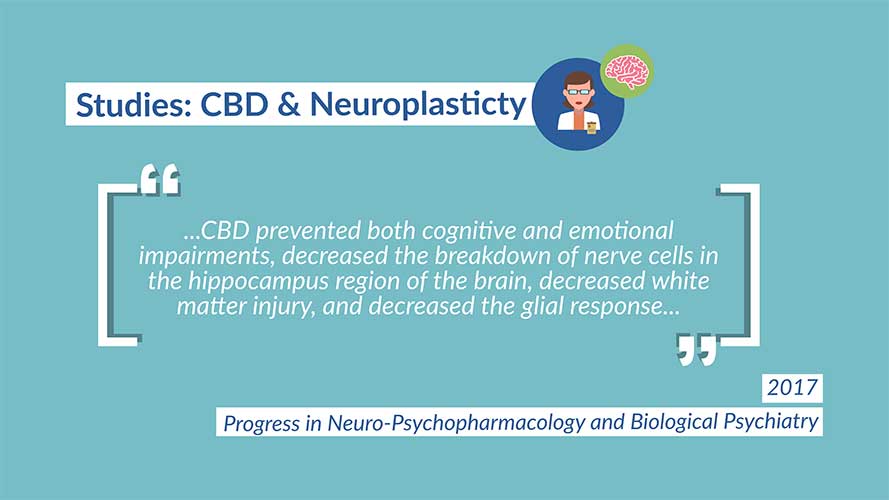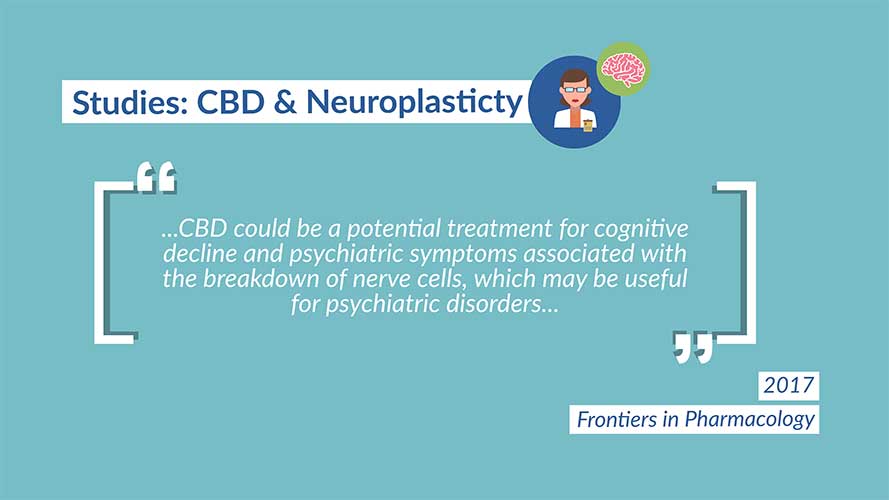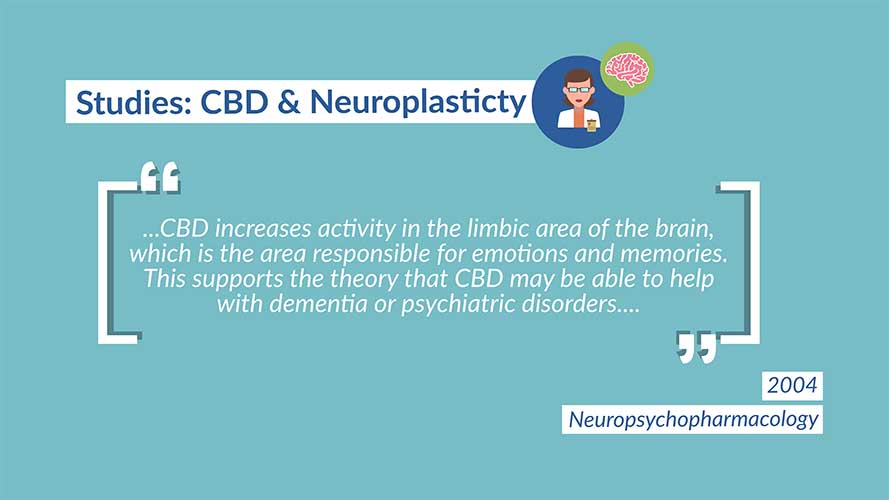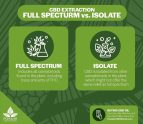Neuroplasticity and CBD
CBD has taken the world by storm with its many proposed health benefits. Can CBD utilize neuroplasticity to help “heal” the brain? This article takes a look into what the research says and if the rumors are true.
What is Neuroplasticity?
Before we go any further let’s talk about what neuroplasticity actually means. It is a term that describes the brain rebuilding nerve connections that it might have lost or the brain creating new nerve connections. Sometimes nerves can become damaged through traumas such as brain injuries and the neuroplasticity of the brain allows the brain to “heal” itself and rebuild the damaged connections. Neuroplasticity also helps the brain with building new connections, like when you learn new information or have a new experience. It is what allows the brain to develop throughout our lives.
Aging actually can lead to decreased neuroplasticity abilities in our brains. Younger children have a greater ability to adapt to changes in the brain since their brains are still forming and developing, and this process becomes more difficult the older you get. However, it is not impossible. Similar to physical exercise, with practice and repetition the brain is able to form stronger connections.
Why Is It Important?
Strengthening the neuroplasticity of the brain is important for a variety of reasons. It allows for recovery after some event that damaged the brain such as a stroke or a traumatic brain injury (TBI). The nerves rebuild themselves to restore brain function back to normal in good cases, or at least to somewhat improve function in the more severe cases.
Neuroplasticity may play a role in mental health as well. Sometimes mental health disorders, such as depression, may result from neurons “misfiring” and it is thought that neuroplasticity may be able to help fix this. Depression might result from not only chemical misbalances, but also neuroplasticity issues as well. Another example is post-traumatic stress disorder (PTSD). Some seem to think that the concepts behind neurogenesis (creating new neurons, or nerve cells) and neuroplasticity may lead to improved future treatments for PTSD.
One big reason people started looking into neuroplasticity is dementia. Using this to help treat dementia or Alzheimer’s Disease is also a possibility in the future. As mentioned above, neuroplasticity declines with aging, which many think goes hand in hand with dementia. The main idea is that we can use neuroplasticity to help increase or maintain cognitive performance in those at risk for Alzheimer’s Disease or for those in early stages of it.
Another way neuroplasticity is important is for learning. Increasing neuroplasticity may help us increase our learning capabilities. For example, research is being done on learning disabilities and neuroplasticity. It is thought that using specific teaching strategies might increase neuroplasticity which in turn intensifies learning.
There are other possible diseases or health concerns where neuroplasticity can play a role, such as neuropathy (aka nerve pain – usually associated with diabetes or fibromyalgia), but these are just a few highlights.
What is CBD?
If you are reading this you probably already know what CBD is, however, it is always nice to have a short review. CBD, or cannabidiol, is one of the cannabinoids (or chemical compounds) found in Cannabis sativa plants. Therefore, it can be derived from either hemp or marijuana plants. It does not have the psychoactive properties that THC exhibits.
It is also safe and non-addictive. There are few side effects, if any. The most reported side effects are tiredness, diarrhea, and nausea. Many people take CBD for its numerous proposed health benefits. It is available in many different forms, such as tinctures, gel capsules, vaping, gummies, and topical products such as creams or salves.
But, can CBD affect neuroplasticity and help with its associated diseases?
What Does the Research Say?
Most of the research is in animal models and examines the effects of CBD in the hippocampus region of the brain. This area of the brain is thought to deal with emotions, learning, memory, and coordination. Therefore, changes in the hippocampus could affect any one of these processes. Most of the studies found that CBD did impact neuroplasticity. The majority of them showed that CBD increased the creation of nerve cells or the remodeling of nerve cells in the hippocampus of the brain. Many of them concluded that this was one of the reasons for how CBD can cause anxiety relief or antidepressant-like effects. Others mentioned this was how CBD could impact coordination and movement or even how it helps with memory loss. The next section describes summaries of the studies that were reviewed for this article.
There also were a couple of studies in humans that showed positive neuroplasticity changes as well, however this was in small groups. There is not a lot of human data out there that supports CBD and neuroplasticity. As it turns out, there might be a reason for this.
In 1998, an article was published in the Proceedings of the National Academy of Sciences that discussed how the cannabinoids CBD and THC are antioxidants and neuroprotective. The authors suggested that because of their antioxidant properties, they would have therapeutic uses as neuroprotective agents, making them ideal candidates for drug targets for certain diseases.
Due to this revolutionary report, the U.S. government issued a patent on “Cannabinoids as antioxidants and neuroprotectants”. The patent states:
“The cannabinoids are found to have particular application as neuroprotectants, for example in limiting neurological damage following ischemic insults, such as stroke and trauma, or in the treatment of neurodegenerative diseases, such as Alzheimer’s disease, Parkinson’s disease and HIV dementia. Nonpsychoactive cannabinoids, such as cannabidiol, are particularly advantageous to use because they avoid toxicity that is encountered with psychoactive cannabinoids at high doses useful in the method of the present invention.”
Currently, this patent is still active. However, it will soon be expiring. The expiration date is April 21st, 2019 which is great news for all of the CBD research teams. This U.S. government patent has likely prevented many investigators from pursuing this research avenue for CBD. If they are not able to market CBD as a neuroprotectant and make money to pay for the trials they put on, then what is the point of doing it? There has not been an incentive for them to do research in this area, but now it seems that there might be.
Therefore, this patent expiration could mean more clinically relevant studies being performed about CBD and neuroplasticity, as it relates to its neuroprotective and antioxidant qualities. This also could mean that they may come up with a drug product, similar to Epidiolex which is indicated for rare childhood seizures, for a neurodegenerative disease in the somewhat near future.
Summaries of CBD and Neuroplasticity Studies
Below are some brief summaries of the studies that were reviewed in this article, as well as links to the articles for more in-depth information if you are curious. The search was focused on CBD and neuroplasticity specifically, however some of the studies look at other compounds in addition to CBD. Some of them also look at other outcomes in addition to neuroplasticity, such as neuroinflammation.
This 2017 study looked whether or not CBD affected cognitive and emotional impairments in mice with bilateral common carotid artery occlusion (BCCAO). BCCAO is just a way for scientists to test ischemic injury to the brain in a research setting. Ischemic injury is the term for when the brain is not getting enough blood and therefore not enough oxygen. These mice were experiencing anxiety, memory problems, and despair from the brain ischemia. Half of the mice were given short-term (48 hr) CBD dosed at 10 mg/kg.
They found that the CBD prevented both cognitive and emotional impairments, decreased the breakdown of nerve cells in the hippocampus region of the brain, decreased white matter injury, and decreased the glial response (brain cells that respond to damage in the central nervous system or CNS) from the BCCAO.
Also, the mice treated with CBD had increased BDNF (brain-derived neurotrophic factor) protein levels, which is a protein responsible for the growth and maturation of brain cells, and therefore deals with neuroplasticity. CBD stimulated neurogenesis (creating new nerve cells) and dendritic restructuring in the hippocampus region of the brain as well which also relates to neuroplasticity.
The authors concluded that this shows how CBD may result in recovery from ischemic injury to the brain, since it targets multiple aspects of the brain recovery.
This 2017 article reviews various studies that relate to CBD, neuroplasticity, and psychiatric disorders such as anxiety, psychosis, and depression. Their review found that short term or repeated dosing of CBD increased neuroplastic changes in the brain.
These changes included slowing the decrease in neurogenesis in the hippocampus and dendrite spines density as well as preventing glial response (described above). CBD was also found to affect regulatory pathways of cells that deal with autophagy (cell suicide) and other important pathways that deal with the breakdown of nerve cells.
The authors concluded that CBD could be a potential treatment for cognitive decline and psychiatric symptoms associated with the breakdown of nerve cells, which may be useful for psychiatric disorders.
Effects of cannabidiol (CBD) on regional cerebral blood flow.
This 2004 study compared a larger dose of CBD (400 mg) to placebo in a small group of humans (all of them were healthy male volunteers). They found that CBD increases activity in the limbic area of the brain, which is the area responsible for emotions and memories.
This study also supports the theory that CBD may be able to help with dementia or psychiatric disorders.
This 2013 study utilized a mouse model to test for a mechanism of CBD and stress. The study used a repeated dose of 30 mg/kg of CBD.
They concluded that CBD may work by creating new nerve cells in the hippocampus of the brain, which led to anxiety relief in the mice.
This 2005 study used a synthetic cannabinoid (aka HU210) in rats to determine if cannabinoids can promote the creation of new nerve cells. The authors suggest that the mechanism behind this is the ability of cannabinoids, such as CBD, to bind to the CB1 receptor which promotes proliferation (or creation) of nerve cells.
Both acute and chronic administration increased the proliferation of nerve cells in the hippocampus region of the brain. However, only the chronic administration promoted anxiety relief and antidepressant-like effects in the rats.
Of note, this study only discussed cannabinoids as a whole and did not mention CBD specifically.
This 2014 study looked at how CBD affects certain brain proteins that deal with neurodegenerative diseases (such as Parkinson’s Disease and Alzheimer’s Disease). The authors state that in another study they were able to show that CBD (in a dose-dependent manner – meaning that the higher the dose the more of the effect) could recover memory deficits in rats caused by too much iron in the brain.
They suggest that having too much iron in the brain may be a possible cause of neurodegenerative disease and cognitive deficits (or memory issues). Another reason behind neurodegenerative diseases they mention is shortages in synaptic energy (dealing with mitochondria) and apoptosis proteins which are likely damaged due to the iron overload in the brain.
In this study they looked at brain proteins involved with these processes when giving rats CBD. They found that CBD helped restore the damage from the iron by bringing the protein levels back to the normal levels they saw in the control group.
From this, they suggest that CBD could be used to help with memory loss and neurodegenerative diseases.
This 2018 study looked at repeated dosing of CBD at 30 mg/kg for 14 days in mice to see if it is facilitated by cannabinoid receptors and if it affects the creation of new nerve cells or remodeling of dendrites (the branches of nerve cells).
They found that CBD produces anxiety relieving effects from the CB1 and CB2 receptors and that this was associated with creation of new nerve cells and the remodeling of dendrites in the hippocampus region of the brains of mice.
The authors conclude that CBD can prevent stress by activating CB1 and CB2 receptors which recruit proteins in the brain involved with creating new nerve cells and remodeling dendrites.
This 2009 study looked at the effects of Sativex, which contains both THC and CBD, on synaptic (the area of the cells where two nerve cells join together) plasticity in humans with multiple sclerosis (aka MS).
They found that the endocannabinoid system does play a role in synaptic plasticity. Specifically, they looked at the motor cortex of the brain, which is the part of the brain that affects movement. Since their study population was made up of MS patients, this makes sense because they have motor coordination problems as part of their disease. Also, Sativex is indicated for symptoms of MS in the EU.
Of note, this study did not solely look at the effects of CBD.
This 2019 study looked at the effects of CBD neuroinflammation and neuroplasticity in rats with diabetes. They used a dose of 10 mg/kg of CBD daily for 30 days.
They found that CBD did improve memory performance and reduced inflammation in the hippocampus region of the brain. Interestingly enough, they found that CBD did not affect neuroplasticity markers in these rats.
The authors concluded that the neuroprotective effects of CBD are due to decreased inflammation, rather than neuroplasticity changes. This is a different conclusion than the other studies and may be due to the fact that these rats had diabetes, while the others did not. Further exploration into the difference in neuroplasticity changes between those affected with diabetes and those that are not would be an interesting area of future research.
This 2017 study looked into whether CBD could be useful in neonatal arterial ischemic stroke (AIS). They used a single dose (5 mg/kg) of CBD in a neonatal AIS rat model.
They found that CBD did help with long-term recovery through improved function regarding areas such as strength and coordination. They also found that CBD decreased the loss of nerve cells and modulated other functions such as apoptosis.
This supports the theory that CBD can induce positive neuroplasticity changes.
Translational Investigation of the Therapeutic Potential of Cannabidiol (CBD): Toward a New Age
This 2018 study was a review of studies that talked about therapeutic uses of CBD, one of which was neuroplasticity increases. They mentioned that reduced hippocampus volume has been observed in patients with mood disorders, PTSD, Alzheimer’s Disease, and schizophrenia, which is why creation of new nerve cells in the hippocampus is important because it would help increase the hippocampus volume.
They mentioned several rat and mice studies (some of which are included in this article) that show CBD can affect neuroplastic changes such as the creation of new nerve cell and synaptic remodeling in the hippocampus of the brain. They also discussed some studies in rats that showed CBD as neuroprotective by preventing neurotoxicity and decreasing nerve cell damage.
One interesting study they mentioned is about how higher THC and lower CBD levels in cannabis were associated with decreasing gray matter in the hippocampus of the brain and decreased cognitive performance. However, higher levels of CBD prevented these effects, suggesting it has a neuroprotective effect (which is likely from the creation of new nerve cells in the hippocampus from CBD).
How Valid is the Research?
It is important to keep in mind that, as with most topics surrounding CBD, most of this research is pre-clinical or anecdotal evidence due to it being performed in animal models or small groups of humans. This means that it is not definitive by any means but is hypothesis-generating. It allows for more specific research to be conducted and eventually clinical trials to be completed.
However, this takes a lot of time and money – which is why the data is lacking. Therefore, currently professional judgement can be used when deciding if the data is “good” or not, and that varies from person to person based on their diverse experiences.
It is always best practice to talk with a health care professional before using CBD to help with any health conditions you may have. They can help you evaluate the research and decide if it is the best option for you. They can also help you determine if any drug interactions exist with any current medications you might be taking and give suggestions for how to avoid them.
Looking to the Future
Taking all of this information into consideration, there seems to be support for the theory that CBD can enhance neuroplasticity, especially in the hippocampus region of the brain. This has future implications for brain injury recovery, mental health disorders, dementia and Alzheimer’s Disease, learning disabilities, and more. With the proper research and the upcoming patent expiration, CBD could become the “go-to” for most brain-related matters and help heal brains. Only time will tell!
References:
- http://scitechconnect.elsevier.com/what-is-brain-plasticity-why-so-important/
- http://mlib.kitasato-u.ac.jp/homepage/ktms/kaishi/pdf/KMJ48-1/KMJ48-1p16-25.pdf
- https://www.sciencedirect.com/science/article/pii/S0306452205004033
- https://books.google.com/books?hl=en&lr=&id=zCEs1Rn6Dh8C&oi=fnd&pg=PA151&dq=neuroplasticity+and+ptsd&ots=mfG-pF6nkp&sig=YBKa6nB0xUCykC-j2oYFej4DxWs#v=onepage&q=neuroplasticity%20and%20ptsd&f=false
- https://www.psychologytoday.com/us/blog/the-athletes-way/201702/how-do-neuroplasticity-and-neurogenesis-rewire-your-brain
- https://www.ncbi.nlm.nih.gov/pubmed/1508410
- https://www.sciencedirect.com/science/article/pii/S089662731200178X
- https://www.nature.com/articles/ncomms9453
- https://www.tandfonline.com/doi/full/10.1080/14737175.2016.1221344
- https://www.ncbi.nlm.nih.gov/pmc/articles/PMC5569602/
- https://www.ncbi.nlm.nih.gov/pmc/articles/PMC20965/
- https://www.sciencedirect.com/science/article/pii/S0278584616302524
- https://www.frontiersin.org/articles/10.3389/fphar.2017.00269/full
- https://www.ncbi.nlm.nih.gov/pubmed/14583744
- https://www.ncbi.nlm.nih.gov/pubmed/23298518
- https://www.ncbi.nlm.nih.gov/pmc/articles/PMC1253627/
- https://www.ncbi.nlm.nih.gov/pubmed/23893294
- https://www.ncbi.nlm.nih.gov/pubmed/29510186
- https://www.ncbi.nlm.nih.gov/pubmed/20633421
- https://www.ncbi.nlm.nih.gov/pubmed/?term=30430393
- https://www.ncbi.nlm.nih.gov/pubmed/28012949
- https://www.ncbi.nlm.nih.gov/pmc/articles/PMC6161644/
Dr. Irene Zollars (Pharm D/MBA)
Latest posts by Dr. Irene Zollars (Pharm D/MBA) (see all)
- FAB CBD Review - November 26, 2019
- Is CBD The Answer to Autoimmune Diseases? - March 7, 2019
- Can CBD Heal the Brain? - February 21, 2019








 The anxiolytic effects of cannabidiol in chronically stressed mice are mediated by the endocannabinoid system: Role of neurogenesis and dendritic remodeling.
The anxiolytic effects of cannabidiol in chronically stressed mice are mediated by the endocannabinoid system: Role of neurogenesis and dendritic remodeling.








